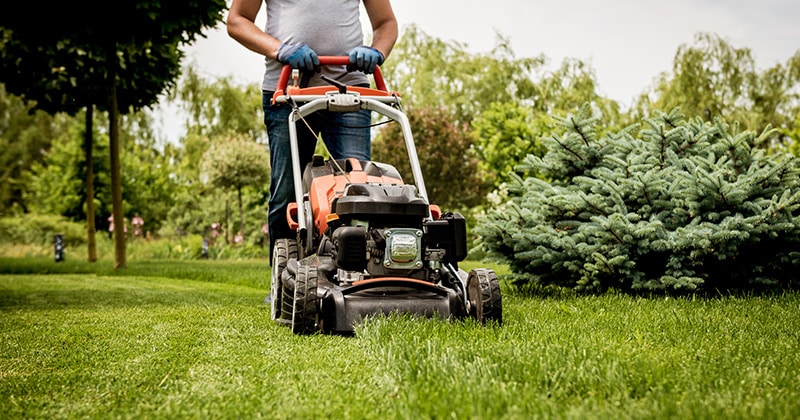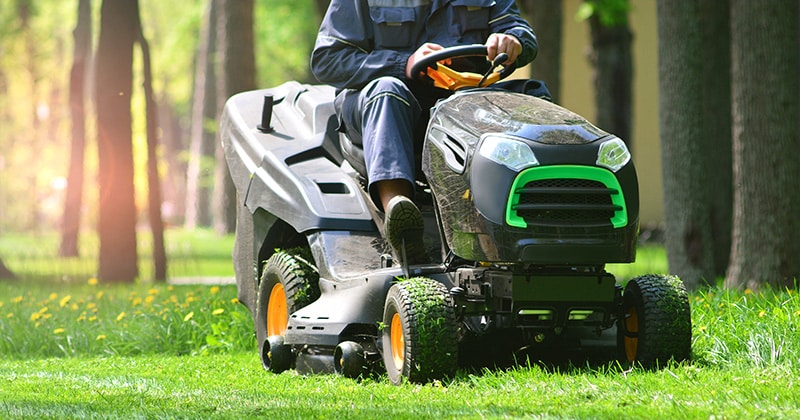The 7 Best Commercial Lawnmowers for Landscapers
In this guide, we review seven top mowers in different categories. You’ll learn what to look for when selecting commercial lawnmowers. We also give you expert tips you can use immediately.

Managing Editor
For professional landscapers, commercial lawnmowers are a key piece of equipment. In this guide, we review seven top mowers in different categories.
You’ll learn what to look for when selecting commercial lawnmowers. We also give you expert tips you can use immediately when shopping for and starting to use a new mower.
The Importance of Quality Commercial Lawnmowers
If you own a local landscaping business, your equipment is an essential part of your operation. Without the right equipment, you simply can’t get the job done.
And it’s not just a matter of completing work for your clients. You want your jobs to be finished quickly and efficiently. This allows you to fit more appointments in every workday, which translates to more money in the bank.
You also want the work to be well done. Customer satisfaction is more important than ever these days, with the prevalence of online reviews. Potential clients will look carefully at these reviews to see if they too should hire you. Did you know that 67% of consumers check reviews before deciding on a lawn care service?
Additionally, happy customers are more likely to refer you to other clients, like friends and family. This is the best way to get new business because it costs nothing from your marketing or advertising budget. When you constantly have new business coming in from referrals, you can devote more time to jobs, which is where your revenue comes from.
No doubt a good portion of your work likely involves cutting grass. So your lawnmower is one of the tools you’ll most rely on for efficiency and quality job performance.
Your mowers must also be as safe as possible for workers in order to prevent injuries on the job. That’s why it’s so essential to have the best commercial lawnmower (or perhaps multiple mowers) for your unique needs.

Overview of Top Commercial Lawnmowers
Are you just starting up your commercial landscaping business? Or perhaps you’re upgrading your equipment or expanding to add more employees? If you’re shopping for commercial lawnmowers, you may be unfamiliar with all the options out there.
Types of Commercial Lawnmowers
Lawnmower technology has improved quite a bit over the last decade. To keep up with the competition and get the performance you want, you first need to understand the different kinds of mowers on the market.
Tractor Mowers
This type of mower used to be the standard for professional landscapers and homeowners with large yards. They are often called “rider mowers” as well. These have the cutting apparatus positioned directly beneath the mower.
Zero-Turn Mowers
Zero-turn mowers are replacing tractor mowers these days. This is because the cutting mechanism is in front of the mower, allowing for a tighter turn radius and greater maneuverability. These are also called “front mount mowers.”
Walk-Behind Mowers
These are the traditional mowers most people think of for grass cutting. They come in push versions as well as self-propelled models.
Stand-On Mowers
Stand-on types are similar to zero-turn mowers. However, instead of sitting in a seat, the operator stands towards the rear of the mower. This affords greater visibility for the user.
Trail Mowers
Trail mowers have no propulsion of their own. Rather, they must be towed behind an ATV or similar vehicle. They’re designed for big jobs on large properties, like farms and golf courses.
Remote-Controlled Mowers
These are operated from a distance, as the name implies. They’re used where other mowers would be too unsafe for the operator, such as on steep slopes. Some remote-controlled lawnmowers also operate robotically. They use a phone app, similar to automated home vacuum cleaners.
Considerations When Purchasing a Commercial Lawnmower
Think about your specific requirements for mowing lawns with your landscaping business. It’s smart to make a checklist of criteria that are important to you.
You may need several different types of mowers for different scenarios. Most home service providers are concerned with fenced residential yards and the ability to work in tight quarters. But they still want to get the job done quickly and efficiently.
If you’re in a more rural area with larger properties, your mowing needs change accordingly. You need to think about cutting width to reduce passes (see below). You might even need mowers for weedy lots or untended pastures.
You may also have a few other clients thrown in your mix. Maybe you cut the baseball field at the local high school. Or perhaps you handle a few small city parks. How do those clients affect your equipment needs? Is it more cost-effective to buy or rent a mower?
You may also need multiple mowers if you have employees out on several jobs simultaneously. It’s worth asking your workers what would help them get mowing done quickly and correctly. They may have suggestions for features you haven’t thought about.
Some common concerns when exploring lawnmowers include:
Cutting Height and Width
Some jobs require very short cuts (like golf course greens). Does the mower in question give you enough variety in height settings? How many passes do you need to make to finish a lawn? The wider the mower, the fewer passes and the shorter the job.
Precision
The less you have to go back to trim or edge, the quicker you can get a job done and move on to the next client. Can the mower navigate around trees and other obstacles? How is the maneuverability?
Operator Comfort
For professionals, the ability to reduce fatigue and use the mower for hours each day is crucial.
Engine Configuration
Two-cylinder motors can be better for commercial work versus four-cylinder ones. Look for adequate horsepower with good torque to run your mower longer than the conventional personal mower.
Extra Features
Every mower has its own features that may make it better. Examples include mulching, safety guards, easy start, etc. You might want a battery mower for some jobs instead of a traditional gas mower.
Durability and Performance
Of course, you want a mower that will last for years and has a reputation for longevity and good customer service.

The 7 Best Commercial Lawnmowers for Landscapers
Below you will find seven top commercial lawnmowers recommended for professional landscapers. All the criteria discussed in the previous section were used to determine which mowers made the list, plus a few more:
- Cost effectiveness and value for the price
- Expected lifespan and durability
- Ergonomics for operator comfort
- Performance under various conditions
- Features for greater efficiency and quality
- Technology to enhance finished results
- Engine power and maintenance
- Warranty protection and parts availability
- Brand reputation and customer service
It’s worth noting that the price of mowers will vary by season and by location. You may be able to get financing on some more expensive models. Bulk discounts are often available for landscapers purchasing several lawnmowers at once.
You might also get a good deal on an annual or biannual service agreement. These are factors you’ll have to work out on your own where you live.
1. Honda HRC216HXA 21” Commercial Mower
Professional landscapers rave about this walking mower online to their colleagues. First, it’s self-propelled, making pushing much easier for workers who mow lawns for hours each day.
Users also like the commercial-grade transmission and rugged features. They say the mower stands up to the demands of professional operation. It features an easy-starting GXV160 Honda engine and a unique Honda Roto-Stop blade stop system. This lets users stop blade rotation without shutting off the engine.
Precision controls on the handle let you vary the speed from 2.1 miles to 4 miles per hour. You can bag or mulch with this mower, and the mulch clippings are ultra fine to blend in with the lawn. You can cut grass from ¾ of an inch to 4 inches with this machine.
The only downside to this mower is the cutting width. At 21 inches, it’s great for small yards. But for larger properties, you’ll have to make more passes, which takes more time.
2. John Deere M and R Series Walk-Behind Mowers
Many landscapers still like the feel of a conventional walk-behind mower (and the extra exercise keeps them fit). John Deere—the most venerable business in the industry—offers several models in the M&R series that get top reviews.
What makes their walk-behind mowers so popular? The hydrostatic drive system is one factor. This generates more power, and it also makes for smoother operation.
Another fantastic feature is the curb-jumping ability with superior ground clearance. It eliminates the need to go back and hand trim along the street side of any job.
There are six models in this series that let you choose between a 36-inch to a 60-inch deck. Horsepower and speed go up accordingly.
The one thing you may not like about the two lower-priced models in the M series is their old-fashioned recoil start. The other mowers at the higher end of the spectrum offer an easier electric start.
3. Cub Cadet SurePath Auto Steer Zero-Turn Mower
Interested in a rider mower with the ability to turn on a dime? Cub Cadet’s SurePath models were designed with pros like you in mind.
SurePath Auto Steer technology uses GPS assistance to reduce unnecessary overlap. This in turn helps you cut more efficiently. This is huge in maximizing your billable hours as a landscaper. Cub Cadet statistics cite this as a 0.52 acres-per-hour gain, which equals 2.96 extra hours per week.
One user said, “Guys in my position are always looking for ways to save money and time…SurePath has helped us do that.”
Another mentioned how easy it was to get employees trained. He said: “It takes me maybe 5 minutes to take a new person out, show them how to use it and then I’m out of the picture.”
Like some other mowers mentioned in this review, the price tag for the two SurePath models may be daunting. Expect to pay upwards of $27,000 as of 2024.
That can be an enormous jump up if you’re going from a walk-behind mower. You have to crunch the numbers to see how many jobs you have to complete to make that pay off.
4. Exmark Radius E-Series Zero-Turn Rider
Another rider mower that professionals frequently tout is this zero-turn wide deck model from Exmark. It doesn’t have all the technology of the Cub Cadet reviewed above, but it comes in at a much lower price tag below $8,000.
Choose from three cutting deck widths between 48 and 60 inches. These models also have heavy frames and a rollover protection system (ROPS).
You can select various cut heights with this mower. Users like the sight window fuel gauge that lets them see when the need for gas is imminent.
If Exmark isn’t as familiar to you as other manufacturers, that may be one negative. Some maintenance and repair shops may not be as knowledgeable about them either. Be sure you can find service near you before purchasing an Exmark.
5. Toro GrandStand Gas Stand-On Mowers
Stand-on mowers are becoming increasingly more popular these days. Users can get on and off more quickly than on a rider mower. But they get the convenience of not having to push the machine.
Professional landscapers also love the increased visibility. This helps them avoid obstacles or low-lying objects that could damage the cutting mechanism.
Toro has long been a reliable name in the lawn mowing industry. And their stand-on mowers in the GrandStand line are now a contributor to that reputation.
There are 15 models in all to choose from, with deck sizes between 36 and 60 inches. As with the John Deere line, the engine size and power vary between models. Most engines come from Kawasaki, but a few use Kohler.
These stand-on mowers provide many features admired by professional landscapers:
- Ability to handle bumpy patches and challenging terrain
- Zero-turn ability for maneuvering in tight areas
- Larger fuel capacity for fewer stops on the job
- High 10-mph ground speed on certain models
- Easy maintenance and engine accessibility
What’s not to like about this line from Toro? Unfortunately, most of the line is not CARB (California Air Resources Board) compliant for clean air standards. If you’re in the Golden State, or want a more environmentally conscious option, you may need to look at other models.
6. Husqvarna Automower ® 550H
Interested in upping your efficiency game with a robotic mower? This Husqvarna model will get the job done for you. Consider these specs:
- Cutting height of 3.6 inches
- Covers up to 1.25 acres
- Handles a maximum incline of 45%
- Object detection through ultrasonic technology and GPS navigation
- Managed through computer, tablet, or mobile phone
Users appreciate that they can manage multiple auto mowers simultaneously. They can do this through the Husqvarna Fleet Services app on one device. It also has an ultra-silent drive, allowing for use even early in the morning or at night.
Like the Spider model described below, the price is hefty, although not as expensive as the Spider. One other downside is that it will take more training and setup for employees to use this mower at first.
7. Spider Cross Liner Lite Professional Remote-Control Mower
Spider falls on the high end price wise for remote control mowers. But you definitely get what you pay for with their models. One of the more modestly priced is this Cross Liner Lite.
Powered by a Honda engine, this mower is ideal for rough terrain on a grade—up to 35 degrees. It offers skid steering and a speed of 3 miles per hour. That lets you cut a half-acre each hour, even if the grass is nearly 4 inches tall.
With a cutting width of 25.6 inches, this remote-control model is on the smaller size for larger areas, which is one negative. The price is another; if you need to go up in size, you’re looking at spending around $12,000 to $40,000 for larger models.
Top Takeaway Tips for Selecting a Commercial Lawnmower
-
Don’t forget to think about noise. This is a concern for both operators and property owners. Robotic lawnmowers tend to be the quietest of all the different categories discussed previously.
-
Remote control or automatic lawnmowers also let you do other tasks while the machine cuts the grass. Would this let you cut down on the time for each job to fit more clients into your daily schedule? That’s a game changer for profits.
-
Using a mower that’s too big for a small yard can cause damage that upsets property owners. A narrower mower may be what you need for these clients. Also, stand-on mowers afford greater visibility to reduce damage.
-
Consider your crew’s experience and physical capabilities. Don’t buy more machines than they can handle. Be sure to train them on any new mowers you purchase, including safety and maintenance.
-
Does your landscaping business do other work, or would you like to? Investing in a trailer mower might be a smart move, for example, if you use your tractor to grade horse arenas or haul downed trees.
-
What does the future of your business look like? Remember to shop for the work you expect to have six months or a year from now. You can even use your new equipment when marketing to prospective customers. They will appreciate that you invested in your landscaping business for the best results.
Melissa can masterfully bring to life any form of content, whether it’s a landing page or a guide to befriending gnomes. When she’s not crafting stories, she’s either crocheting, smothering her cats in unwelcome affection, or spending time with her husband.

Business Solutions For Field Service Pros
EverPro offers specialized solutions designed for home and field service professionals. We’ve got the business tools to help you get the job done.



